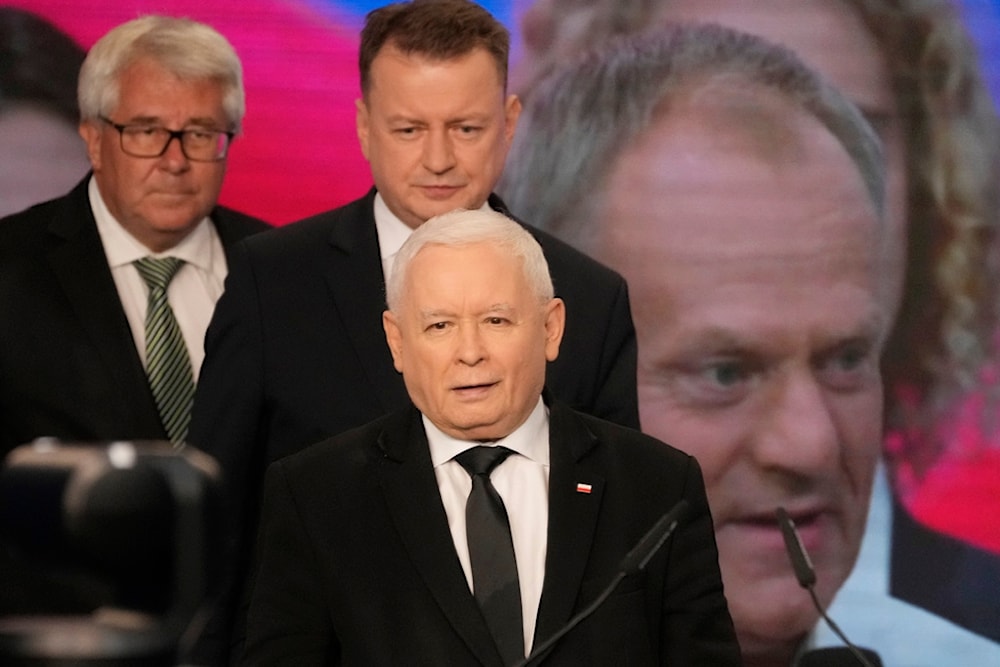Polish opposition pushes for EU migration pact exit, plans referendum
Recently, the Polish border guard has been documenting almost daily incidents of aggressive behavior by migrants near the metal fencing on the Belarusian border.
-

Jaroslaw Kaczynski, center, head of the Polish national conservative Law and Justice party, speaks to supports after voting ended in the election to the European Parliament in Warsaw, Poland, on June 9, 2024 (AP)
On Saturday, Jaroslaw Kaczynski, leader of Poland's largest opposition party Law and Justice (PiS), announced that the Polish opposition is calling for the government to withdraw unilaterally from the EU migration pact. He further pledged to begin collecting signatures in September to initiate a referendum on the matter.
"From September we will be collecting signatures for a new referendum to demand to terminate the migration pact," Kaczynski was quoted as saying by his party on X.
PiS parliamentary fraction chair Mariusz Blaszczak affirmed the intention, stating on X that this issue is of "absolute importance as it concerns our security."
"Together we can force the government to do what it should have done long ago — unilaterally withdraw from the migration pact," he added.
In May, the Council of the EU adopted the Pact on Migration and Asylum, designed to combat illegal migration, and human trafficking, and enhance penalties for related crimes. The reform also includes provisions for a fair distribution of migrants among EU countries, aimed at alleviating the burden on member states that are frontline external borders.
Recently, the Polish border guard has been documenting almost daily incidents of aggressive behavior by migrants near the metal fencing on the Belarusian border. Approximately 200 individuals on average attempt to breach the fencing each day, with incidents involving the throwing of stones and branches at Polish guards being frequent.
Read more: Tensions increase after Polish military helicopter trespasses Belarus
The origins of this issue trace back to mid-2021, when tens of thousands of migrants amassed along the borders of Belarus with Poland, Latvia, and Lithuania in an effort to enter the European Union.
Polish authorities responded by tightening border controls, deploying military personnel, and accusing Belarus of instigating the migrant crisis.
At its peak, Poland deployed about 15,000 soldiers along the border with Belarus, in addition to police and border guards, and imposed a state of emergency in the region.
Moreover, the EU accused Belarus of encouraging thousands of people fleeing war-torn parts of the world to try to cross its borders and has threatened to impose new sanctions on Minsk and airlines that transport migrants.
Poland eventually closed its borders with Belarus, an action that was met by condemnation from Minsk.
Minsk, on its part, accused Warsaw of exploiting the migrant situation to forcefully repel migrants into Belarusian territory.
The Belarusian Foreign Ministry summoned Poland's charge d'affaires to condemn Warsaw's decision to close one of its three existing border crossings with Belarus as "unilateral" and "inhumane".
"All responsibility for the deterioration of the conditions for the operations of their carriers lies with the initiator of the restrictive measures, that is the current government of Poland," a Belarusian Foreign Ministry statement said.
Read more: Poland may close all border crossings with Belarus: Morawiecki

 3 Min Read
3 Min Read








